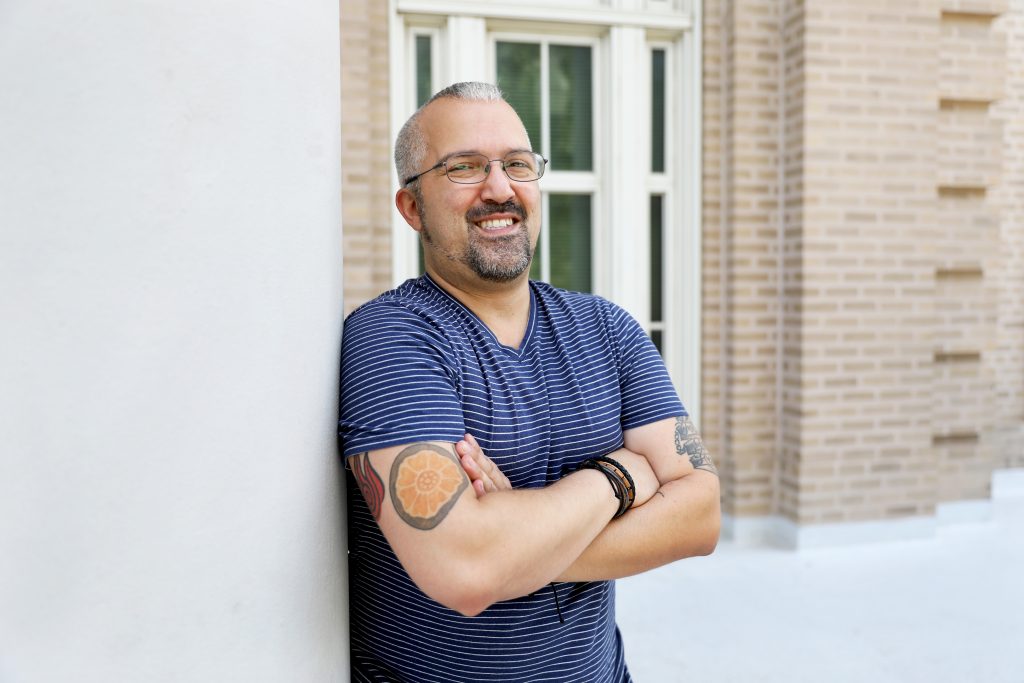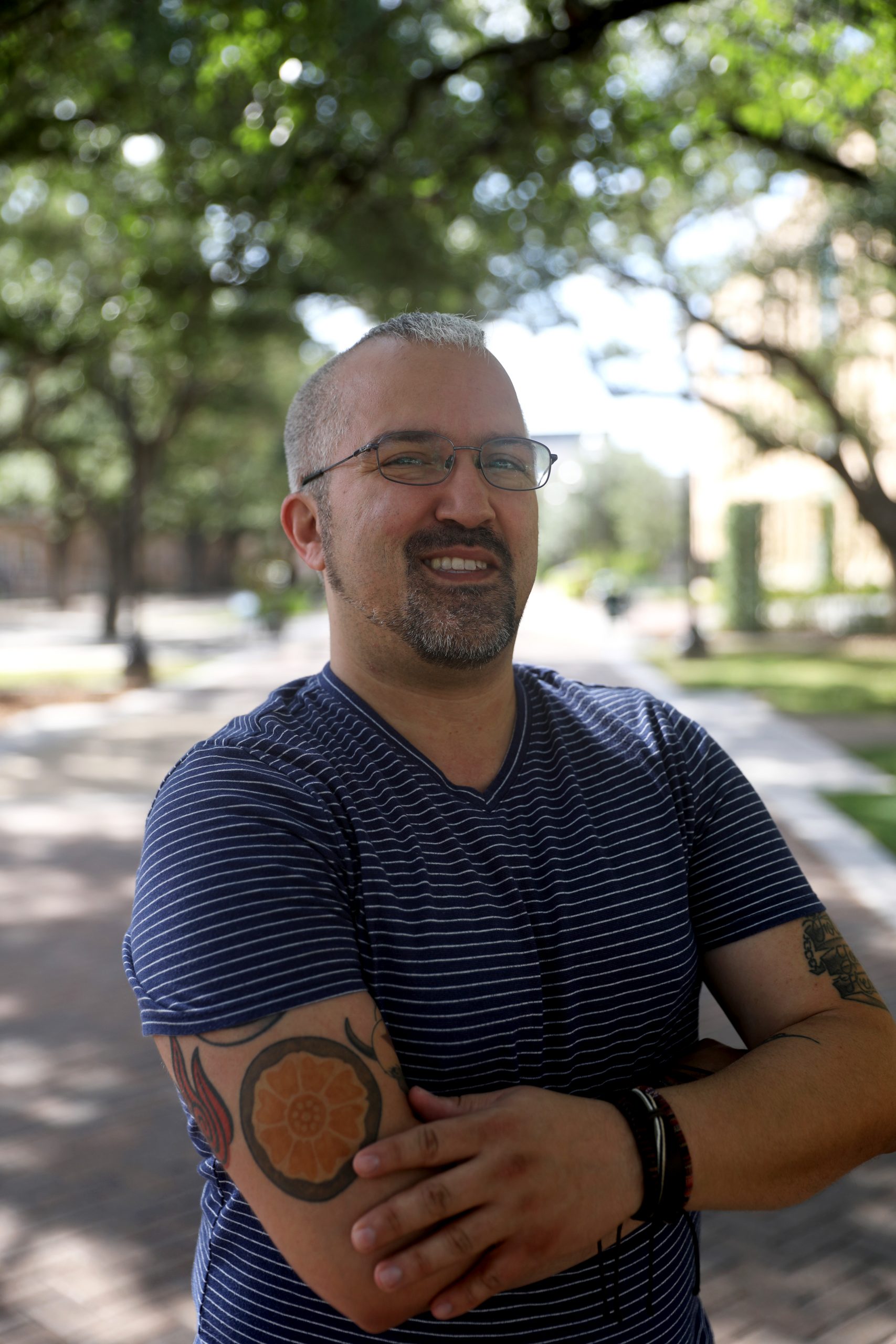Manuel (Manny) Grajales ’22: The Story of Us
For this first generation student, history is more than just names and dates, it’s the story of who we are.

By Brittney Nava ‘23
Photos by Anna Burson ’24
College of Liberal Arts
From watching period piece films with his grandpa to leisurely analyzing pop culture through a historical lens, the study of past events has always been a point of fascination for New York native Manny Grajales. Today, he carries expert-level knowledge in the realm of 20th century U.S. anti-war movements and Latinx history.
Grajales lengthened his official title by three letters this summer when he successfully defended his dissertation, Our Fight is Here: The Puerto Rican Anti-War Movement, 1940-1975.
His research, however, reflects more than just his specialized knowledge — it’s a testament to his family, his background, and his love for the complexity of history.
“A lot of the research questions for my dissertation are based on my family dynamics,” Grajales said.
While growing up in a Puerto Rican household, Grajales was exposed to varying ideologies regarding the principles of war.
On one hand, many of his relatives hold a religious-based disdain for killing in any context; on the other hand, Grajales noted a strong tradition of military service dating back to when his grandfather served in Panama during the Korean War.
“My abuela has this big picture with my abuelo in the center in his uniform. There’s like 15 or 20 [relatives] in that picture, showing something a few scholars have called a ‘Hispanic tradition of service,’” Grajales said. “And the pride that comes with that doesn’t mute the pride of being Puerto Rican either.”
As military service has historically been linked with notions of citizenship, Grajales was curious about what propels people to resist it.
“[I had] questions about the viability of military service as an escape; the pride of military service as an identity marker without losing cultural, ethnic or racial identity; and what led people to reject something so tied to active citizenship,” Grajales said.
While his family played a huge role in inspiring his research, he also credits them greatly for his accomplishments.
“My family was very pivotal to my success,” Grajales shared. “The big thing is they’ve supported me through this journey even when they don’t understand elements of it, which even I don’t understand certain elements of it still.”

“A bit of advice to graduate students coming in, or even undergrads who are thinking of going to grad school or going into professional life — entering a new space is scary and difficult, especially if you feel that you are not seen, but you can find your community,” Grajales shared. “It takes a little work and sometimes it’s frustrating but they’re here, we’re here.”
Navigating Academia as a First Generation Latino Student
As a first-generation college student, Grajales has been navigating unfamiliar waters in academia, but not without the help of supportive faculty.
“When I went back to school for my bachelor’s at Texas A&M University-Commerce as a non-traditional student of 26, I ran into faculty that took the time to mentor me as a first-generation student,” Grajales shared. “They guided me and my curiosity.”
While looking into graduate schools, Grajales was very interested in Texas A&M University, but the decision was cemented when he attended a conference on campus and met Felipe Hinojosa, who would later become his advisor.
“Before I’d made my full decision, I was going through some personal stuff, and he cared about my humanity as well as me reaching my potential as a scholar. To me, that idea of building community is pivotal,” Grajales said. “I knew once I met him that this was the place I needed to be.”
The critical role that empathetic faculty play in a student’s success has been crystal clear for Grajales, especially during his time working toward his Ph.D.
“It was scary. Being a first-generation student you don’t know any of these processes, but I was fortunate to have an advisor who guided me through the whole process,” Grajales shared. “[Hinojosa] was also a first-gen student, so he had to navigate a lot of these waters, too.”
Beyond faculty, Grajales also greatly credits the community of latinos that he encountered during his time at Texas A&M who helped him feel more seen as a minority student.
“A bit of advice to graduate students coming in, or even undergrads who are thinking of going to grad school or going into professional life — entering a new space is scary and difficult, especially if you feel that you are not seen, but you can find your community,” Grajales shared. “It takes a little work and sometimes it’s frustrating but they’re here, we’re here.”
Grajales’ Next Steps
Though his time in Aggieland has come to a close, Grajales will carry the Aggie spirit with him to the University of North Texas where he’ll begin as a history lecturer. Teaching a Mexican American history class in addition to survey classes, he’ll have the opportunity to inspire his students to see the intrinsic value of studying history.
“It’s the story of us. It’s the story of who we are,” Grajales said. “You can put it in a national context, but if you look deeper, even our own family histories tell the story of how we fit into the broader picture.”
